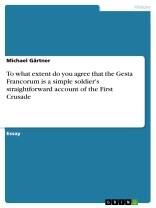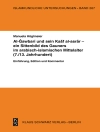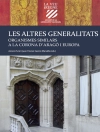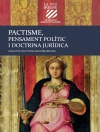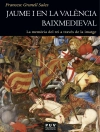Essay from the year 2003 in the subject History of Europe – Middle Ages, Early Modern Age, grade: 54 %, University of Wales, Aberystwyth (Department of History), course: HIH 3124, language: English, abstract: In the eleventh century the Christian lands of Western Europe were in trouble.
Afflicted by the repeated invasions from North and South and East, by the collapse of
internal order, by brutal oppression of the weak, by the laxity and ignorance of the
clergy, and by the unrestrained tyranny of feudal war lords, life in the West was – in
the words of Thomas Hobbs – “nasty, brutish, and short”1. The problems were
compounded, when nomadic soldiers – recently converted to Islam – occupied
Jerusalem and the Holy Land, thus causing the pilgrimage to them far more
hazardous. But all the prayers, the sermons the condemnations and the appeals had
amounted too little until in November 1095, Pope Urban II preached in Clermont. For
his largely ignorant and unreflective audience, the Pope threw a harsh light of
criticism on the fallings of Western society. But he pointed out, that the liberation of
Jerusalem2 and the Holy Land from the “infidels” was a redemptive task worthy of
men, who could call themselves milites Christi3, the liberation of the Eastern Church,
alone was “unpopular in the West”4. At a stroke, Pope Urban intended to divert the
reckless and violent men of the West into the path of righteousness. At the end of the
tenth century the Church attempted to set a formal limit of customary violence.5 They
could now practise warfare in a holy course. […]
1 http://www.kaiku.com/cloisters.html (24.02.2003)
2 H. E. Mayer, The Crusades, translation by J Gillingham, (Oxford: Oxford University Press, 1972),
41-48 and Jonathan and Louise Riley-Smith, The Crusades: Idea and Reality 1095-1274, (London:
Edward Arnold, 1981), 43-44.
3 K. B. Wolf, ‘Crusade and narrative: Bohemond and the Gesta Francorum’, Journal of Medieval
History Vol. XVII, David Abulafia et al (eds.) (Amsterdam: 1991), 209.
4 Erdmann, The Origin of the Idea of Crusade, 330.
5 Under the terms of Pax Dei the Bishops tried to place certain classes of people and property beyond
the reach of warring factions. At the same time, the Truga Dei took a lead from an earlier decree by
Carolus Magnus and limited the time available for fighting.
Michael Gärtner
To what extent do you agree that the Gesta Francorum is a simple soldier’s straightforward account of the First Crusade [EPUB ebook]
To what extent do you agree that the Gesta Francorum is a simple soldier’s straightforward account of the First Crusade [EPUB ebook]
Cumpărați această carte electronică și primiți încă 1 GRATUIT!
Limba Engleză ● Format EPUB ● Pagini 35 ● ISBN 9783638194945 ● Mărime fișier 0.1 MB ● Editura GRIN Verlag ● Oraș München ● Țară DE ● Publicat 2003 ● Ediție 1 ● Descărcabil 24 luni ● Valută EUR ● ID 3650988 ● Protecție împotriva copiilor fără
